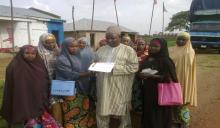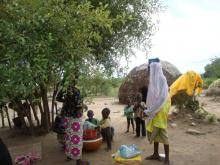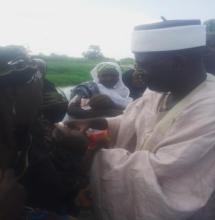Intensifying Border Vaccination: Six Northern States Reposition for Interruption
Kaduna, 25th August, 2014 - Nigeria's stride towards Polio eradication quickened recently as a result of targeted activities in reaching children hitherto underserved with polio vaccine at key inter-state borders in Northern Nigeria. In concert with five other polio high-risk states, polio teams from six (6) border LGAs visited 168 border settlements immunized 26,749 children with Oral Polio Vaccine in Kaduna State alone, during the August, 2014 campaign.
World Health Organization (WHO) analysis of January this year revealed that 67 percent of polio compatible cases were found in border areas. Apart from that, children in the border settlements are not only missed during Immunization Plus Days (IPDs); the areas are reservoir for transmission of wild polio virus as a third of the cases reported in 2013 were found in States’ border LGAs.
Giving details of the current strategy, the WHO Zonal Coordinator of the North West zone, Dr Abdullahi Suleiman mentioned that that ‘a five-step approach was employed: micro-planning, settlement enumeration, logistics support, monitoring and supervision, and service delivery through health camps and oral polio vaccination’
Planning the 5-step Approach
At the planning stage, measures were put in place through networking and collaboration with stakeholders (traditional, religious leaders as well health workers) at the border areas to ensure that critical logistics in the campaign are put in place. The act of bringing stakeholders together this way is called “border synchronization”. For instance, between on August 1-7, 2014, 42 different inter-state border planning meetings were held at various locations in the implementing LGAs
At one of the planning meetings held in Gusau, Zamfara State with six LGAs from Kaduna, Katsina and Kano states in attendance, the LGA Chairmen agreed on dates and time for simultaneous vaccination at the different settlements along their borders.
‘Immunization without borders’
The Polio Emergency Operations Centre (EOC) 2014 strategic document stipulated that borders of any kind-whether international, intra-national, inter-state, inter-LGA or inter-ward and hard to reach areas, have perpetually shown to be havens for poor immunization services, and consequently having low population immunity.
For the August, 2014 IPDs, the four-day polio campaign along the country's borders, WHO deployed its ‘best hands’ comprising cluster consultants, LGA facilitator and Field volunteers to conduct ‘concurrent monitoring’, to ensure that no child in the eligible age cohort was missed. One LGA Facilitator, Mr. Stephen Parom aptly described the move as “SIA sans frontiers”-meaning supplemental polio campaign without borders.
Treatment of minor ailments at border posts.
For the period of the exercise which involved vaccination teams from Bauchi, Kano, Kaduna, Katsina, Niger & Zamfara states, and conducted from August 9-12, 2014, children under-five years living along the borders were not only vaccinated with oral polio vaccines, but they and their caregivers were also treated for minor ailments at designated ‘health camps’ located at the borders. At one of the health camps, an aged woman nodded in Hausa: "God bless government for remembering us for once'
Reaching nomads with enthusiasm
To most health-workers, fording through hard to reach and even dangerous to reach areas to reach the nomadic Fulanis almost always living in make-shift structures along the borders is harrowing, but they find the outcome very rewarding as they count themselves achievers for reaching the hitherto unreached.
Sustaining Border Immunization.
With this renewed commitment and political will, the border settlements will continue to receive intensive supervision to ensure that all areas falling within the definition of a border are adequately combed and all eligible children immunized.
01 Vaccination at Kaduna-Kano Border
02 LGA Facilitator cross-checking data tools
03 Nomadic Fulani settlement
______________________________________________
For more information, please contact:
Charity Warigon
Email: warigonc [at] who.int



